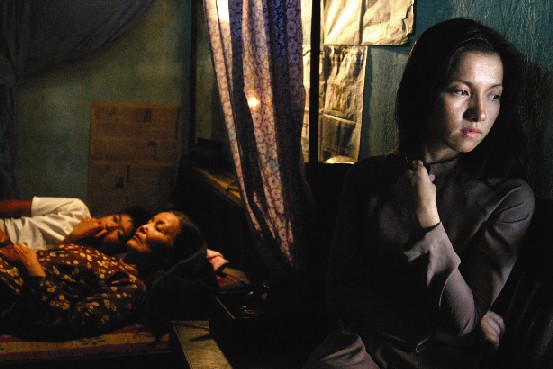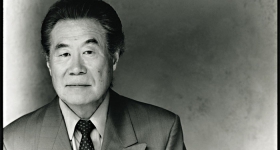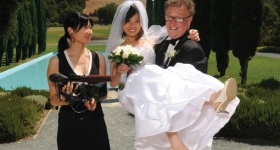
The countdown to opening night of the film festival being only a few days now, I'm going to kick off Hyphen's SFIAAFF movie blogging -- with the closing night film. But this is not going to be a review, the way you expect films to be reviewed. There's a fine review by Ravi Chandra (Hyphen subscriber & friend :) ) all wrapped up and ready to roll, which you can find here. No need for me to reinvent that wheel.
This is more of a meditation on what "Journey from the Fall" surfaces for me and perhaps other 2nd-generation Vietnamese Americans like me. This is a movie my parents saw before I did. This is a film they asked me to see. Because through it, they hope I will see a war I never witnessed, and have never quite known how to form my own opinion about.
You may have heard before, from some other Vietnamese American kid growing up in the States, how raw it felt whenever our country, that war, came up in social studies, in passing remarks, in movies... Always, Viet Nam was spoken in someone else's bitterness, someone else's shame or anger or loss. I grew up in a sea of my parents' mourning: everything that had been taken from them they superimposed on everything they were trying to rebuild. And so it was never just the past -- it was also the rosy-if-third-world future they'd seen on their honeymoon, the perfectly-obedient-Vietnamese (not Vietnamese American) children they would have had, if only all the forces that had created us would have just stopped and let us be. My family was tethered to a frozen moment, a flight from a garden that existed nowhere now on earth.
The US withdrew from Sai Gon in 1975; I started school in 1978. My teachers were not deliberately political, and I don't have a memory of being singled out for humiliation. But I remember cringing when the recriminations flew around me, not sure if I was actually at fault. I took after my dad in developing an aversion to any movie about Viet Nam. The US seemed intent on winning on screen the war it had lost in real life: killing in fantasy or studio the vermin they had not eradicated in villages overseas. And even though, as an ex-Navy officer for the South Vietnamese, my father had no qualms about Viet Cong dying -- I suspect that like me, watching these staged massacres, he did not feel far enough from the line of fire.
But if I couldn't take Hollywood's word for what happened to us, neither would I really take my parents'. In neither case, it seemed, were the implications for me quite favorable. Then I left for college. There I learned that the Viet Cong were heroic freedom fighters and the US were post-colonial oppressors, which made both my parents *and* Hollywood wrong, which really seemed quite perfect. If you were formed in the kind of Marxist/ ethnic studies/ post-colonial studies crucible that I was, then you have likely heard this third representation of the war -- one that serves a larger and admirable anti-imperialist doctrine, but I think, has refused to listen to the stories of Vietnamese refugees in order to keep its convictions firm, its denunciations clear. And I wonder if, between the two Western representations I've mentioned here, the academic account hasn't done the greater disservice to Vietnamese refugees -- given its professional obligation to educate, and its political boast to champion the oppressed.
But as the resources for movie production and distribution move increasingly out from under the thumb of big studios, the movie screen becomes increasingly a place (perhaps the place) for dissenting voices, even overtly political case-making. In movie theaters arguments are won, public opinion formed or changed; interestingly, the American public will pay for a ticket and some popcorn to be educated. And so in Journey from the Fall, a film (as Ravi says) of, by and for Vietnamese Americans, we have a different Viet Nam war on screen than the one that plagued my childhood. We have the images my parents have wanted me to see for thirty years, so that I could make up my mind as to who was really on my side. Hope my fellow armchair Marxists are lining up for their tickets; time to get a little more edumacated.










Comments